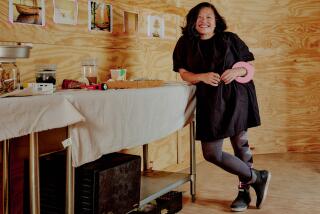Ex-Refugee Lives to Help Children Find Their Way
Half an existence ago, when Oni Vitandham was a 14-year-old Cambodian orphan and refugee sleeping on the hard cement floor of a Long Beach parking garage, she would dream of the life she’d never had.
Today, as founder and guiding vision of an international nonprofit agency, Vitandham is helping create that life for more than 2,000 Cambodian children.
“I have traveled rough roads,” says Vitandham, now 32 and head of the Progressive United Action Assn. “I want to be able to help those people who travel the same roads.”
Like many stories of Southeast Asia, hers is shrouded in mystery and pierced by the harsh glare of real events. It begins, Vitandham says, in 1972 when she was born in the Kompong Speu province of central Cambodia to a mother who died in childbirth and a father of royal descent.
As a soldier and patriot, her father opposed the rise of the communist Khmer Rouge, which, under the murderous regime of Pol Pot, caused the deaths of as many as 1.5 million of their countrymen from 1975 to 1979. Vitandham believes her father was among them. But before his presumed death, he managed to place his daughter with friends committed to her survival.
The next few years were nightmarish. Guardian after guardian died at the hands of their country’s tormentors -- some, she says, before her eyes. As each disappeared, however, another emerged to protect her. Her route to survival, Vitandham says, took her from the killing fields and forced-labor camps of Cambodia, through the jungles of Laos, to the re-education camps of North Vietnam and, finally, to a refugee camp in Thailand. From there, , after four long years, she immigrated to the United States in 1983.
She was 11, and her struggles were far from over. Life for refugees was harsh in the new country, especially for young children without families who had seen what Vitandham had seen. She ran away from the people taking care of her, lived for a time in the parking garage, then among monks at a Cambodian Buddhist temple and, finally, in foster and group homes.
Somewhere along the way, Oni Vitandham -- having created her name from the initials of all those who had helped her -- got the idea of helping others.
She couldn’t do it immediately. First she had to finish high school and then support herself while attending community college. She worked at various jobs, including housecleaning, tutoring, cashiering at restaurants and translating documents.
“I did everything I could think of,” Vitandham says. “I was very aggressive about finding jobs. I worked constantly, never having time for a social life.”
Eventually she plowed her savings into purchasing and operating a pair of doughnut shops in Long Beach, where she still lives. It was the profit from those ventures that allowed her to create the Progressive United Action Assn. in 1995.
“I wanted to make a difference,” she says. “I knew what it was like to be alone with no way out. I wanted to help kids.”
Headquartered in a four-room office suite in Signal Hill, the PUAA operates 10 schools throughout rural Cambodia with 21 teachers who serve an estimated 2,500 impoverished students, ages 5 to 15. Subjects include English, computer skills, leadership -- and soon to be added, art and culture.
“English is the technical language of the world, and art and culture is the essence of Cambodia,” says Michael H. Blasdell, a Long Beach-based real estate agent who is chairman of the PUAA’s board of directors and oversees its educational efforts. “We are giving them job skills,” he says, “because [without them] they have no future.”
Largely due to the difference in economies, the group is able to support its efforts for the relatively modest sum of about $7,000 a month, mostly from fundraisers, memberships and private donations. But it would like to do more, says Blasdell -- specifically, remake the schools into full-service institutions.
“We’re teaching them to improve their own country,” says Blasdell, who divides his time between Southern California and Southeast Asia. “We’d like to have 200 schools -- we’ll go anywhere that we’re invited.”
Vitandham will go almost anywhere she’s invited too -- and often does -- to speak of her experiences under the Khmer Rouge. She’s working on a book about her life, tentatively titled “On the Wings of a White Horse.” And she has been a frequent critic of the current Cambodian government, calling for, among other things, public trials of the surviving leaders who supported Pol Pot.
“I believe they should be brought before the International Court of Justice,” Vitandham says of her former persecutors, some of whom hold positions of authority in the present regime.
One consequence of Vitandham’s outspokenness is that she has never returned to the land of her birth. “I would love to go for a visit,” she says, “but it’s not safe yet. I think they might lock me up in prison or assassinate me.”
Eventually, she hopes to go back.
“I want to see what it’s like in my country today,” Vitandham says. “I want to visit the people who live in difficult ways. I hope someday to go back and be safe and help the people of my country.”
At least 21 of her emissaries are already there.
More to Read
Sign up for Essential California
The most important California stories and recommendations in your inbox every morning.
You may occasionally receive promotional content from the Los Angeles Times.










